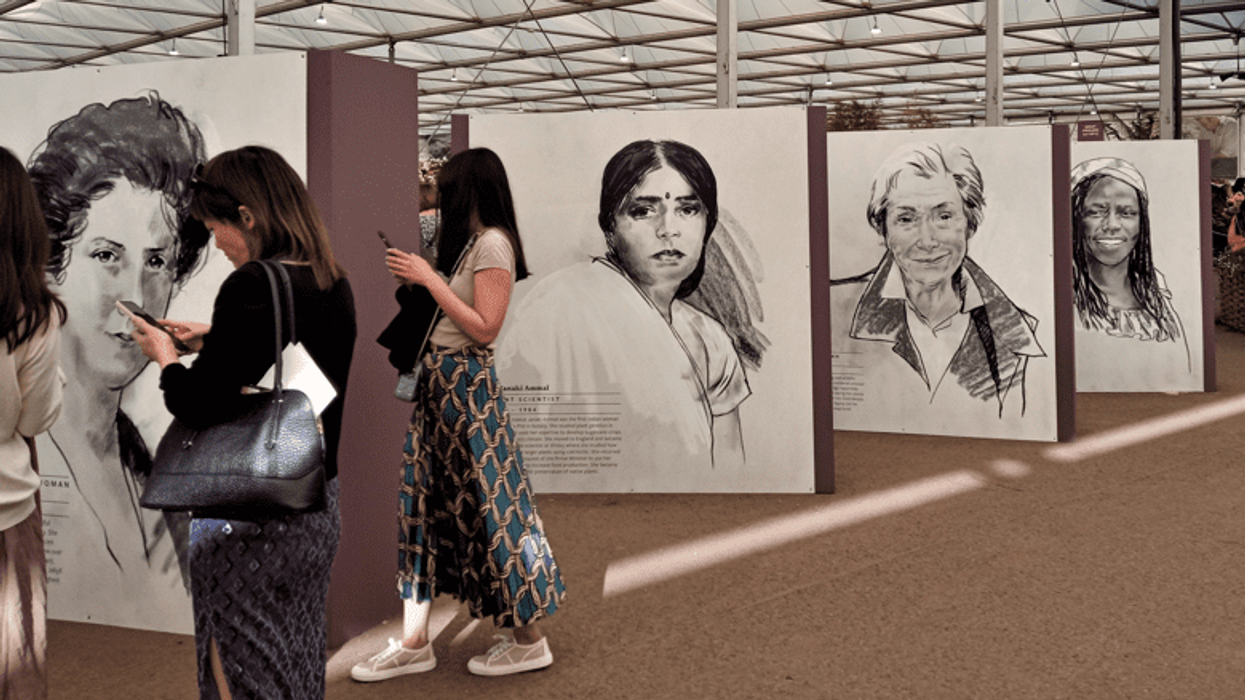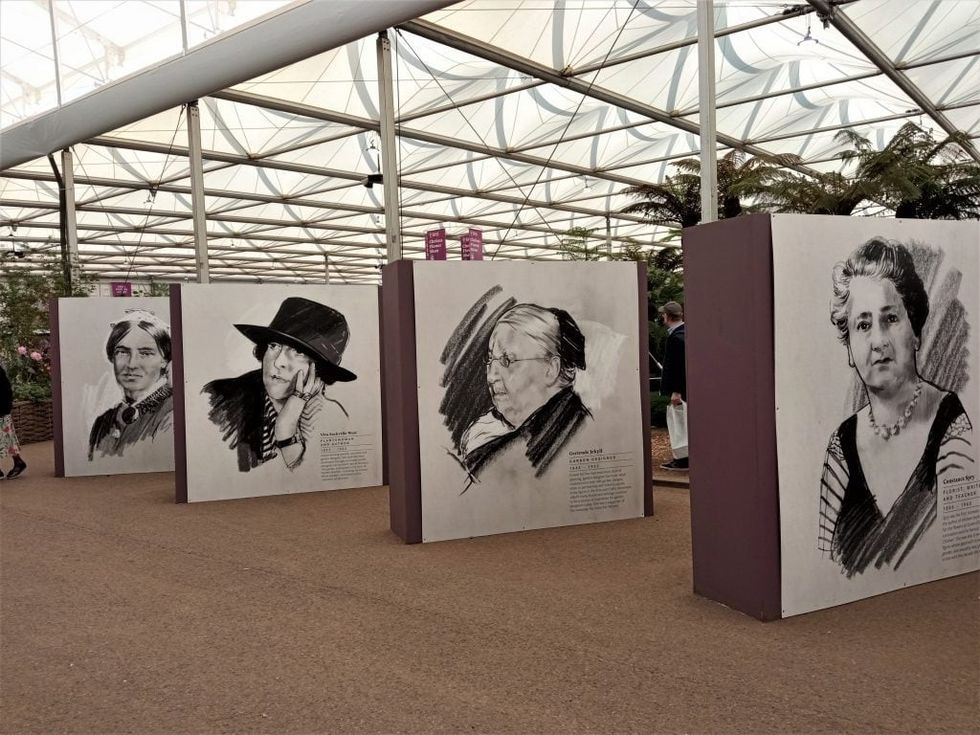This year’s Chelsea Flower Show has celebrated eight ‘Heroines of Horticulture’, among them the Indian scientist Dr Janaki Ammal, who struggled against the odds and especially male prejudice to make their mark.
Ammal, who was born in Kerala in south India in 1897, did cutting-edge research at RHS Wisley in Surrey from 1946-51 and was one of the leading botanists of her time. Magnolia kobus ‘Janaki Ammal’ is named in her honour.
As a young woman she flourished only after she was forced to leave India where her less-talented male colleagues would not allow her to rise. In marked contrast, in the UK, she was headhunted by the Royal Horticultural Society (RHS).
The RHS, which was founded in 1804 and has been putting on the Chelsea Flower Show for 101 years, felt that women were struggling to get recognition in the higher reaches of the profession. So this year, its director-general, Clare Matterson, decided to do something to correct the inequality that has long existed.
It was Matterson who drew Eastern Eye’s attention to the display in the Great Pavilion at the Chelsea Flower Show, where a poster, ‘Heroines of Horticulture’, said: “For centuries, women have nurtured and studied plants. Yet historically, their roles in horticulture – often perceived as a man’s world– have rarely been recorded.
“We have selected just eight women to highlight. Some are relatively well known, others may be new to you. All were passionate and knowledgeable about plants and gardens and their achievements deserve to be celebrated.”
There were large images of eight women, with a brief write-up on each one.
The one on Ammal said: “Plant Scientist. 1897-1984. Edavalath Kakkat Janaki Ammal was the first Indian woman to receive a PhD in botany. She studied plant genetics in the US and used her expertise to develop sugarcane crops suited to India’s climate. She moved to England and became the first female scientist at Wisley where she studied how to rapidly grow larger plants using colchicine. She returned to India at the request of the prime minister to use her knowledge to help increase food production. She became an advocate for the preservation of native plants.”
Ammal was given to wearing white cotton saris and chappals even in the snows of Surrey. If Eastern Eye readers make the journey to RHS Wisley, they will find her photograph prominently displayed at the “Old Lab”, which opened as a museum in March this year but where science experiments were once carried out by Ammal and her colleagues.
A label, “From lab to landscape”, next to her photograph says: “Dr Janaki Ammal was the first female scientist to be employed at Wisley.”
It adds that she examined “the genetic characteristics of cultivated plants. People have been breeding plants to create new improved varieties for centuries, but Dr Janaki Ammal pioneered new ways of manipulating the number of chromosomes to produce new varieties.
“Some of her plants still grow on Battleston Hill in the Gardens here today.”
Fiona Davison, RHS head of libraries, has told Eastern Eye that Ammal “worked on genetic manipulation and chromosome counting. And she manipulated the number of chromosomes, particularly in magnolias, to create brand new magnolias with bigger, more robust blooms.
“Dr Ammal developed a reputation in the 1940s when gene manipulation was really very new. She was a cutting-edge scientist in that regard.
“She came to England because she was having trouble in India as a woman, and she was from what was regarded as a lower-caste family. There was a glass ceiling within the Indian academic world that she wasn’t breaking through. So she came to England to work first at the John Innes Institute. And then the RHS head-hunted her from there.”
In a journal called Plant Review, her “remarkable contribution” has been recounted in an essay, “A wanderer of many worlds”.
The article said: “While working as a lecturer at the Women’s Christian College, Madras, in the early 1920s she received a scholarship from the University of Michigan to study botany where she achieved a Master of Science in 1925 and, in 1931, became the first female Doctor of Botany in the United States.
“Though Janaki had enjoyed her time with the RHS, she returned to India in 1951 following an invitation by Jawaharlal Nehru, prime minister of the newly independent country, to lead a project to reorganise the Botanical Survey of India. In 1977 the government of India gave Janaki one of its most prestigious awards, the Padma Shri.”
Alongside Ammal, the other Heroines of Horticulture include campaigner Wangari Muta Maathai (1940-2011), who became the first black African woman to be awarded a Nobel Peace Prize in 2004. The Green Belt Movement, which she founded, empowered women to fight deforestation in Kenya, leading to the planting of more than 20 million trees and inspiring the creation of similar projects across Africa.
Also in the group of eight are garden designer Gertrude Jekyll (1843 1932); plantswoman and author Vita Sackville West (1892-1962), who developed Sissinghurst Castle Garden alongside her husband Harold Nicolson; and florist Constance Spry (1886-1960), who was the first “domestic Goddess”, the author of 13 books and was responsible for the flowers at Queen Elizabeth II’s coronation and the famous ‘Coronation Chicken’.
The other three are rose expert Ellen Wilmott (1858 1934); Beth Chatto (1923-2018), who won 10 gold medals at Chelsea; and plant collector and illustrator Marianne North (1830-1890) who painted more than 900 species while travelling solo around the world.
An article in the Chelsea Flower Show Guide 2023 by Louise Curley noted that “through history, women have had to defy repressive societal norms to pursue their passion for plants”.
It says: “Today, women can be found in roles across the industry: nursery owners, garden designers, plant scientists, cut flower growers, food producers, professional gardeners, modern-day plant hunters and garden writers. Once a male-only institution, the RHS had its first female president, landscape designer Elizabeth Banks, from 2010-2013, and the current director-general, Clare Matterson CBE, took over the reins from Sue Biggs last year. However, women are still under-represented, especially in sectors such as arboriculture and landscaping, and there is still a gender pay – and opportunity – gap across the industry.”
Pollyanna Wilkinson, who designed the Heroines of Horticulture display, was quoted as saying: “When I teach garden design, 90 per cent of the students are female, but that doesn’t translate into the number of female designers on Main Avenue at Chelsea. I retrained as a garden designer when I had young children and it can be a wonderful profession if you need to balance work and life commitments. Creating a show garden, however, requires a huge amount of time and is difficult for anyone. If you’re also having to marry that with childcare or any number of other tasks, it’s very hard.”
Nevertheless, Wilkinson “hopes that in highlighting the invaluable contributions of female horticulturists both past and present, more women may be encouraged to pursue a rewarding career with plants in future”.





